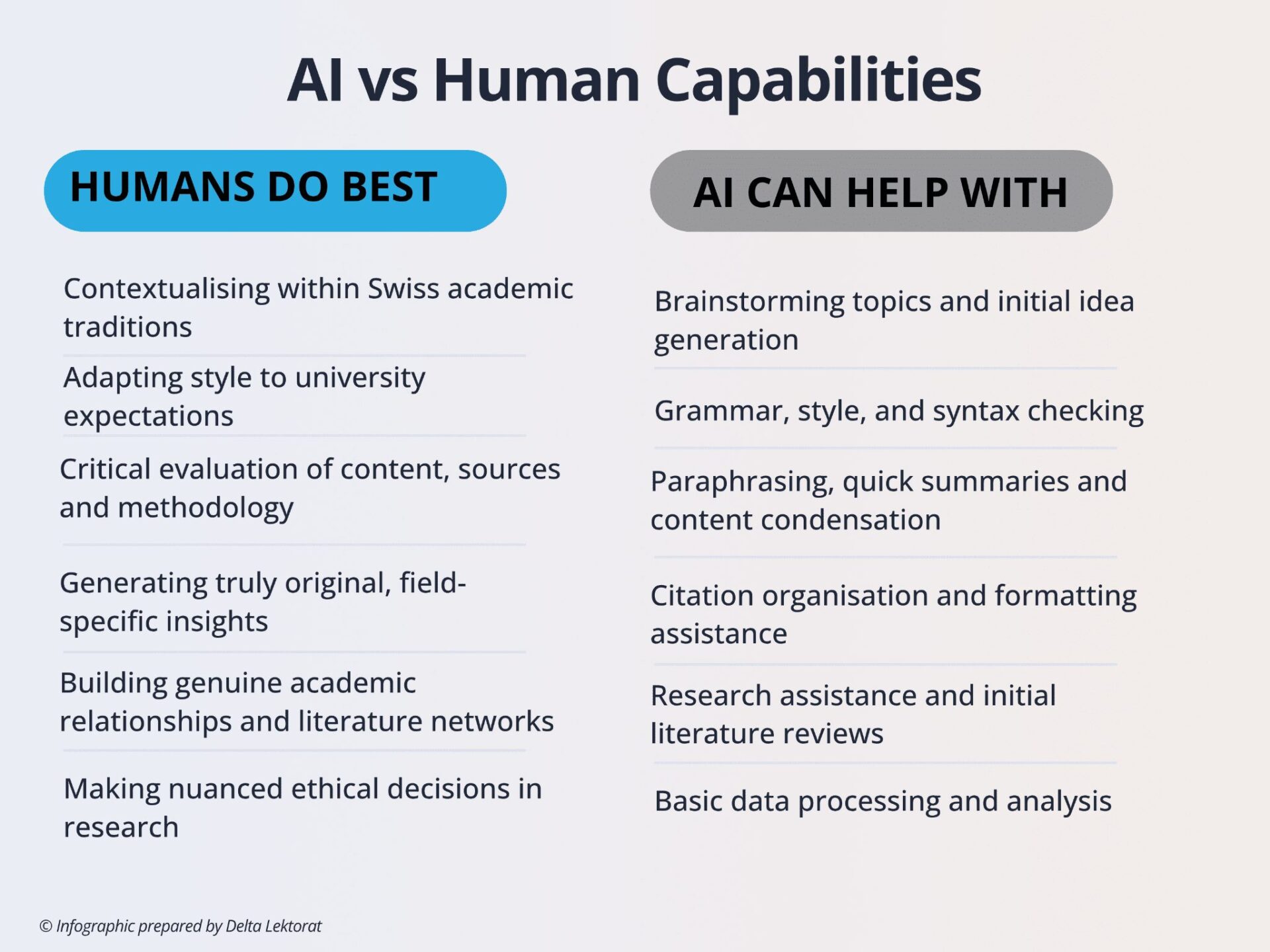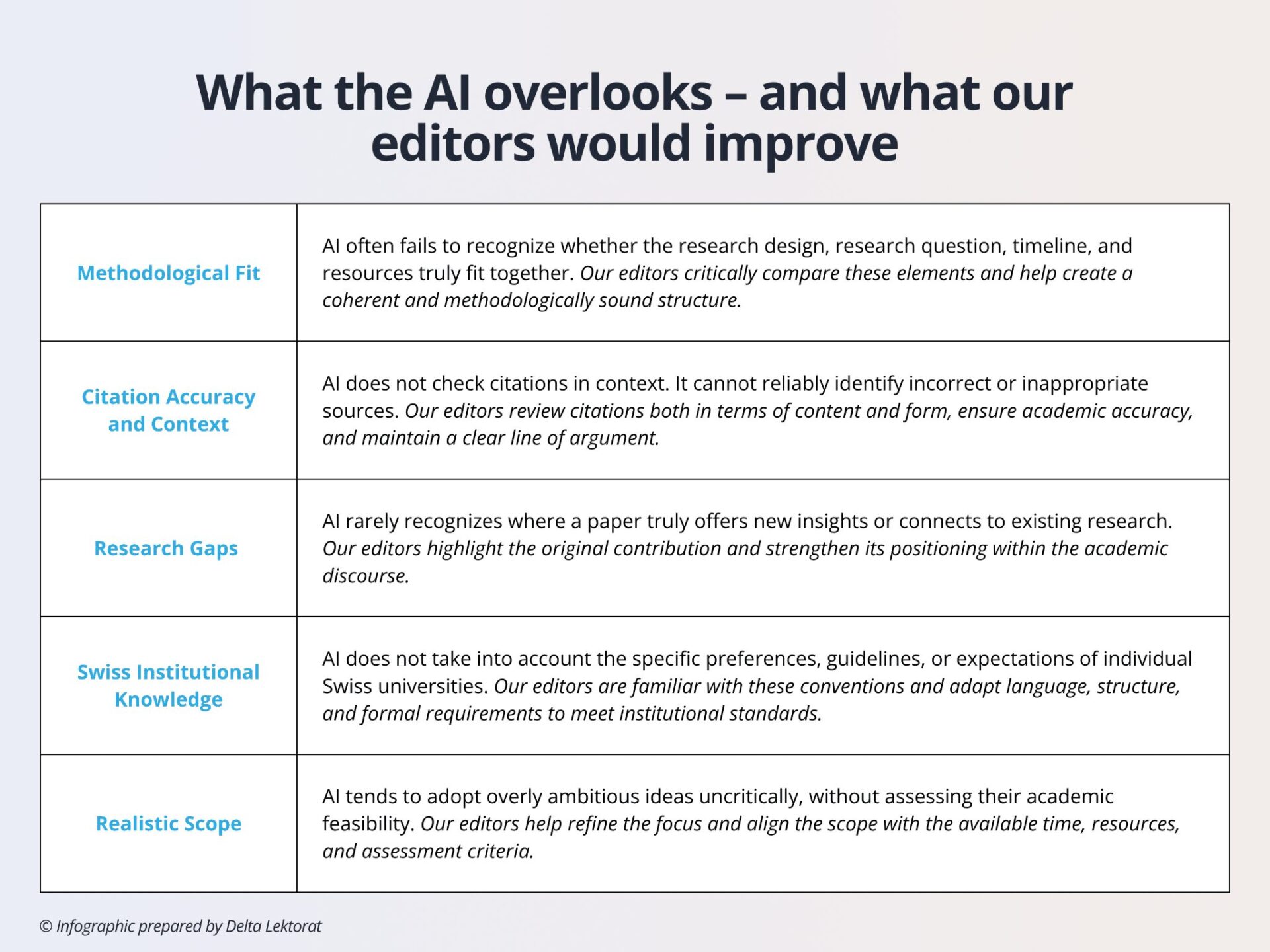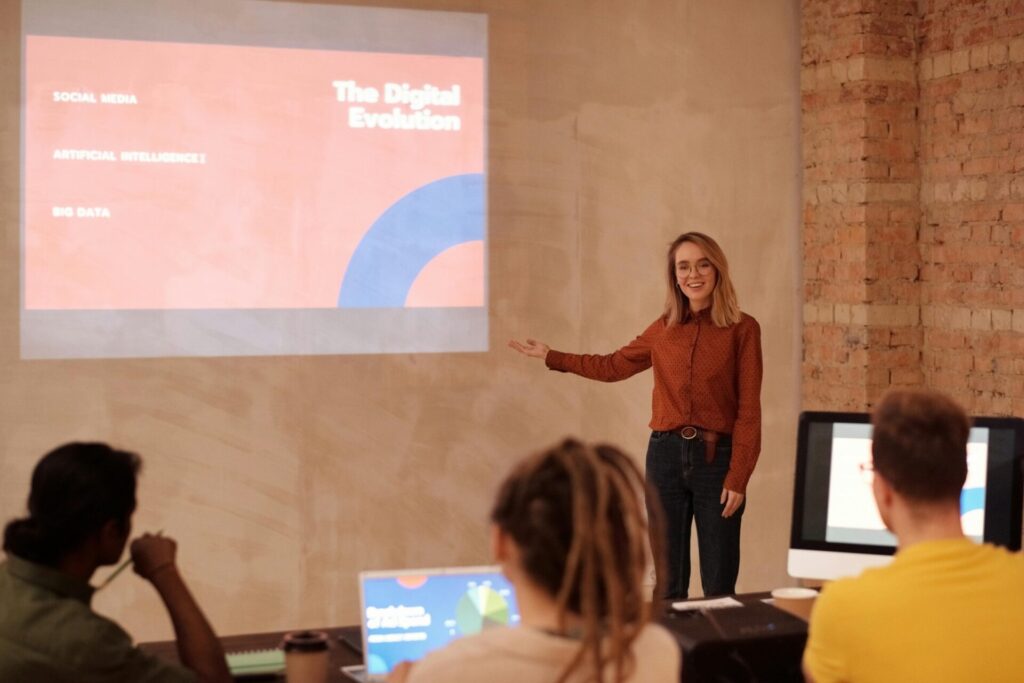Key takeaways: AI tools can support academic writing, but they cannot replace the depth, precision, and context that human academic proofreaders bring, especially within the expectations and conventions of Swiss universities and schools. Here's why we advocate for responsible AI use while keeping human expertise at the core of what we do.
Inhaltsverzeichnis
Introduction
Let's be transparent: Delta Lektorat's relationship with AI in academic writing is…a bit of a balancing act. We recognise its potential for streamlining specific tasks, and yes, we use some AI-powered tools both internally and strategically in our workflows. For example, we recently incorporated an AI assistant on our website to answer any questions you might have regarding Delta Lektorat. You can meet Lea when you visit our homepage. Isn't that cool?
Nevertheless, we are very skeptical, especially when it comes to upholding scientific integrity.
Our experience with AI goes beyond just implementation. After years of proofreading and coaching students on thesis writing across Switzerland and beyond, we've witnessed firsthand both its potential and its pitfalls. This article reflects our considered stance on AI in academic writing: how to harness its benefits while maintaining the fundamentally pro-quality, pro-integrity, pro-genuine learning stance that defines excellent scholarly work.
The Limitations AI Can't Overcome
From our experience, AI's biggest flaw isn't "hallucinating facts", it's missing the deeper context and institutional nuance that top-level academic work requires. AI excels at surface-level tasks, such as grammar correction and basic formatting (e.g., citation), but fails critically at offering timely and personalized feedback. For example, it might suggest a quantitative approach even though clearly qualitative methods are required, or recommend citation styles that do not conform to the specific requirements of individual universities. This is precisely where the invaluable worth of human expertise becomes evident
An experienced academic proofreader understands not only the formal guidelines but also the unwritten rules: how University of Zurich professors, for example, prefer argument structures differently from ETH Zurich supervisors, or specification of theoretical frameworks favoured in Swiss business schools versus international programs.
Moreover, while AI can generate novel combinations of ideas, it is only trained on existing data, making it fundamentally backward-looking rather than innovative. Swiss universities expect genuinely original insights that do not replicate existing research.
The Academic Integrity Dilemma and Swiss Academic Standards
The most concerning trend we observe is the "invisible co-author" problem with students submitting work where AI contributions are so deeply embedded that even they can't identify what's original anymore. That is precisely why we offer AI humanising and rewriting services to help students refine AI-generated drafts into their genuine academic work. As students increasingly outsource their writing to AI, the line between their own thoughts and machine-generated content becomes increasingly blurred, raising fundamental questions about authorship and intellectual ownership.
Swiss academic institutions are particularly strict about this because they value Bildung (the concept of personal intellectual development through discovery, a process and a status of an individual, which is a response to education and teaching). But what happens to this foundational educational philosophy when students can bypass the intellectual effort that Bildung requires?
For example, the ethical complexities in sensitive research areas such as medical studies, psychological research, and social investigations require the kind of nuanced human judgment that AI simply cannot replicate. Swiss academic institutions place tremendous emphasis on research ethics and the subtle decision-making necessary to navigate these ethical landscapes.
We have put together a comparison table highlighting what AI can do versus what humans excel at. As AI tools become increasingly integrated into academic environments, students and researchers must understand the distinct strengths of both AI and human capabilities. Rather than viewing AI as a replacement for human expertise, the most effective approach is to recognise AI as a powerful complement to uniquely human skills.

It is also worth noting that the difference between AI assistance and human expertise isn't just about quality; it's about understanding the unwritten rules of Swiss academia. Here's what our proofreaders catch that AI misses:

Our Balanced Approach to AI
Technology only unfolds its true value when it enhances human expertise. At Delta Lektorat, we see AI not as a replacement, but as a partner in a thoughtful, learning-oriented process. We use it to increase efficiency, open new perspectives, and at the same time ensure the quality of academic work. Our team stays informed about the latest developments to support students in the responsible and ethical use of AI. This way, we ensure that technology does not replace thinking but inspires it. We see AI as a tool with great potential, especially as a strategic brainstorming partner that can spark creative processes. However, our focus is on building long-term competencies rather than short-term speed.
When it comes to the actual proofreading and editing process, we deliberately refrain from using AI entirely. This ensures that every revision remains authentically human, guarantees the highest scientific integrity, and leaves no room for AI detectors to question the originality of a paper. The best academic results do not come from dependence on AI, but from the conscious collaboration between human and machine. Our experts remain the heart of every editing process: they bring critical thinking, subject-matter depth, and personal guidance, qualities no technology in the world can replace.
Conclusion: The Future of Academic Support
The choice isn't AI or human editing; it's finding the right balance. Used responsibly, AI can be a helpful assistant. But human insight is what transforms good writing into exceptional work. Ready to experience it? Schedule a consultation with our experts here.
Want to enhance your writing process? Read our article on 7 Game-Changing AI Tools Every Student Needs for Academic Writing.
Frequently Asked Questions (FAQs)
Our proofreaders provide guidance, suggestions, and coaching that help students improve their academic voice while ensuring all ideas and arguments remain authentically their own.
We accept both drafts and final papers. You can easily submit it here or reach out directly at info@deltalektorat.ch if you have any open issues you'd like to clarify beforehand.
Our extensive expertise in the academic traditions of Switzerland and the entire DACH region sets us apart. We not only understand the fundamental principles of academic writing, but also the specific expectations, cultural nuances, and institutional particularities of German-speaking universities, an understanding that neither AI nor generic proofreading services can provide.
Not necessarily. We support the responsible use of AI, especially for brainstorming, formatting, and initial research. However, all critical analyses, arguments, and original insights must come from the students’ own academic work. Equally important is to disclose the use of AI transparently.
Disclosure: This article was prepared by human contributors. Generative AI tools were used to support brainstorming, language refinement, and structural editing. All final decisions regarding content, recommendations, and academic insights reflect human judgment and expertise.
References
CloudPublish. (n.d.). AI and creative writing: A creative revolution or a creative crisis? Publishing News. https://cloudpublish.co.uk/publishing-news/15/ai-and-creative-writing-a-creative-revolution-or-a-creative-crisis
Danner, H. (1994). 'Bildung': A basic term of German education. Educational Sciences, 9, 1-30. https://www.helmut-danner.info/pdfs/German_term_Bildung.pdf
ETH Zurich. (n.d.). Academic integrity. ETH Zurich. https://ethz.ch/en/the-eth-zurich/education/ai-in-education/academic-integrity.html
Klimova, B., & Pikhart, M. (2025). Exploring the effects of artificial intelligence on student and academic well-being in higher education: A mini-review. Frontiers in Psychology, 16, Article 1498132. https://doi.org/10.3389/fpsyg.2025.1498132
Thompson, R. (2025, July 3). LLMs vs human ethics: Who really wrote that paper? A 2025 reality check. Medium. https://medium.com/ai-simplified-in-plain-english/llms-vs-human-ethics-who-really-wrote-that-paper-a-2025-reality-check-559224287ebd
Youn, C. H., Salam, A. R., & Rahman, A. A. (2025). AI-driven tools in providing feedback on students' writing. International Journal of Research and Innovation in Social Science, 9(3), 58-67. https://dx.doi.org/10.47772/IJRISS.2025.903SEDU0006
Dea is a senior researcher passionate about helping students navigate the world of academia. She explores the intersection of AI and scholarly work, offering insights on how technology can enhance writing, research, and learning. As the Head of Partnerships at Delta Lektorat, Dea leads collaborations with universities and student associations to promote excellence in academic writing and innovative approaches to thesis support. Her work focuses on bridging traditional academic rigour with emerging digital tools that empower students and scholars alike.



